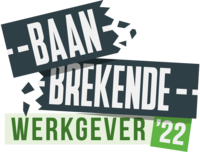
FOKUS Online: How do you create connection in the digital workplace?
Digital workplace
Not only attracting new people is extremely important for companies, retaining employees is also a challenge nowadays. The importance of talent management is therefore increasing rapidly. How do you tackle this now that the digital workplace is ubiquitous?
Thierry Marien is an HR Business Partner at the Antwerp-based consultancy firm Pàu. He is responsible for attracting and retaining new talent. "It's not that I'm operationally involved in valuation and development, but it's my job to help set up a structure for it and to think about how we can organize it as well as possible. So actually more from a strategic vision than from the practical implementation," he explains.
It goes without saying: the labor market today is a candidate market. They also notice this at Pàu. When Marien talks to potential new employees, it hardly ever happens nowadays that they are the exclusive interlocutors, usually there are also competitors involved. Moreover, the influx of candidates has also become smaller compared to a few years ago. "The applicant today is in the driver's seat," says Marien.
"As a company today you have your strategy to which you link your skills and competencies and next to that you have the applicant, who has his own strategy. The applicant knows very well what he can and wants, what his strengths and challenges are and where his ambitions lie. The trick is to align all these elements and make a match. What's more, it is becoming increasingly important nowadays to select on potential, to nurture that potential and allow it to blossom."
Continuous dialogue
By getting very close to that talent with a dedicated team of internal colleagues, at Pàu they try to both maintain the match with the employee and allow potential to decolonize. "We opt for almost continuous dialogue and you can take that fairly literally. Even though our consultants spend a lot of time at customers' premises or in a digital workplace, we talk to them at least every two weeks. We explicitly want to keep that finger on the pulse, so that we can proactively help build a career path for the future and help shape their sustainable careers."
In this way, continuity is built in and, in the longer term, loyalty and connection, Marien argues. "In the consulting world, that can be a problem. You carry out a project with a client, the project is done and then suddenly the manager has to decide what to do with the consultant now. Often these people end up 'on the bench', they lose motivation and start looking for another employer. And then everyone is surprised they want to leave. The risk of that happening with us is very small."
We opt for almost continuous dialogue, and you can take that fairly literally. Coaches, talent managers, and chapter leads
Employees often work in the customer's offices. Or, these days, at home. That means that the contact between them and the parent company has to be maintained extra well, so that both parties keep in touch with each other. At Pàu they work with three different roles: coaches, talent managers and chapter leads. Marien: "A coach oversees a maximum of six coachees. Coaches have been around for a long time. You can see them as a kind of buddy for employees. They are not direct managers, but they offer a listening ear for all possible problems and can quickly and easily point the way to colleagues if there are questions. In the old days, something like that was probably called a godfather or a godmother."
The role of the talent manager is filled differently, says Marien. "Our talent managers are very experienced colleagues who know the company inside out, who have been through all the ranks and who are seasoned in the business. They no longer have any other function within Pàu, they only deal with talent management. The ratio within the company is one talent manager per sixty employees. There are about 120 of us now, so we currently have two talent managers on board."
Their concrete task is mainly to follow up on the consultant's work with the customer. To this end, they also keep in close contact with the managers there: how is the consultant doing? Are there any working points? What is going well, what could be better? "And such matters are then also taken into account in the so-called Individual Development Plan. For each employee this goes deeper into the ambitions, what is going well, what could be improved, where can he or she use help, how can Pàu help to do the job better. And from there the objectives are also determined."

Chapter Leads
Soon, Pàu will strengthen coaches and talent managers with chapter leads. "There are currently no such leads, we are in the process of recruiting them internally," Marien explains. "We anticipate that we will be appointing six of them. For us, a chapter is actually a 'field of study'. That could be, for example, UX design, UI design, digital product development, front end development, agile working or mobile development. Each of those subject areas will have an owner who will become the face of it, so to speak."
"Suppose an employee says: I want to specialize in this field because I feel it suits me, then the chapter lead comes into the picture to help give concrete form to those ambitions. They will guide employees to achieve this. For example, the chapter lead will help clarify the steps that someone needs to take to become proficient in a particular field. What tools does he or she need to learn? Where are they going to find those tools and training? Perhaps we will then also put those people together from time to time to brainstorm and enable cross-pollinations."

Inspire and mentor
The chapter leads will continue to perform their regular jobs within the company. They will follow developments in their field closely, however, and are therefore specialists for good reason, says Marien. "They are primarily people with a lot of passion for their profession, but they can also use that passion to inspire and guide other people."
That this approach works is substantiated by figures. "Our retention rates are a lot higher than the industry average," says Marien. "It's no exception that in consultancy firms of our size, 20 to 40 percent of people leave each year. For us, it's just over ten percent. It also has its impact on our growth. We obviously want to grow as a company, but we want to do that in a controlled way, precisely so that we can keep that structure of driven talent management. Look, if I have to, I can hire fifty people right away tomorrow. But after a year, maybe twenty of them will still be here. Simply because you can't possibly scale up the internal coaching at that kind of hiring pace in the same way."
Slack and Teams versus the coffee machine
That constant dialogue at Pàu is also reflected in hybrid and digital working. Marien: "The way we organize the digital workplace, for example, is based on an internal survey. What do you think of it? What do you miss when you work from home? And what do you miss about office work? And that has become the basis of our digital workplace policy. We will never make office work compulsory, but I think it is important. We do that in a very cool, trendy environment, especially in our new office building, where employees can help each other, challenge each other and be inspired. And of course we also use digital tools. But you will never be able to replace the conversation at the coffee machine with Slack or Teams in the same way."

